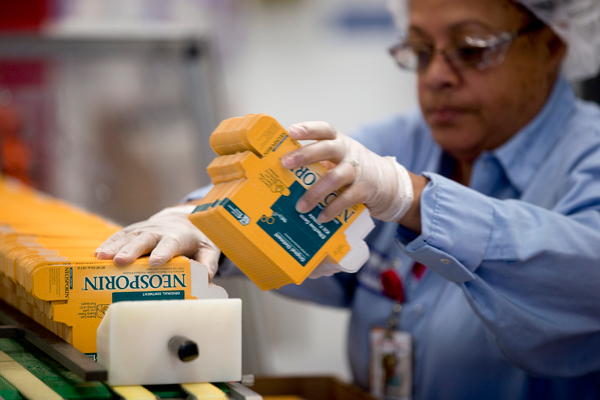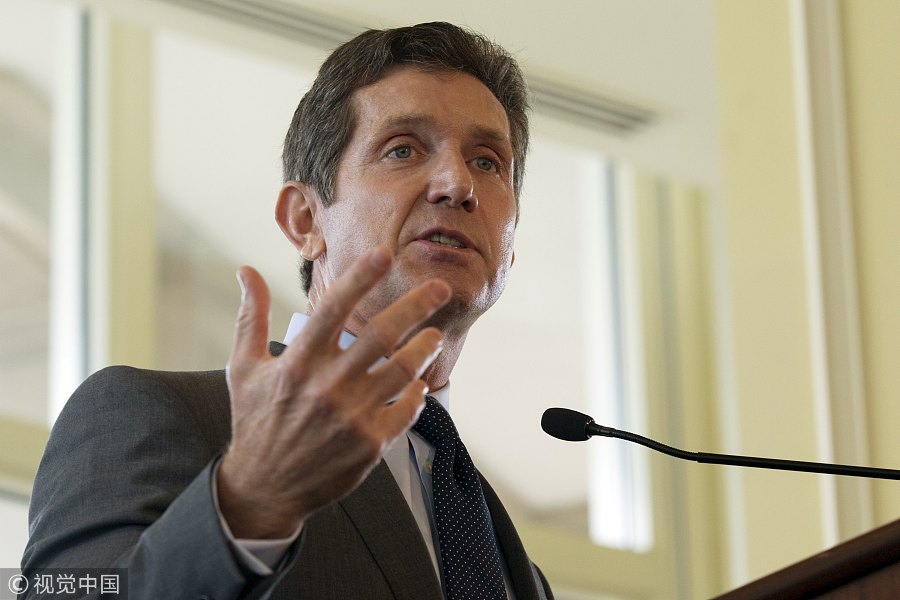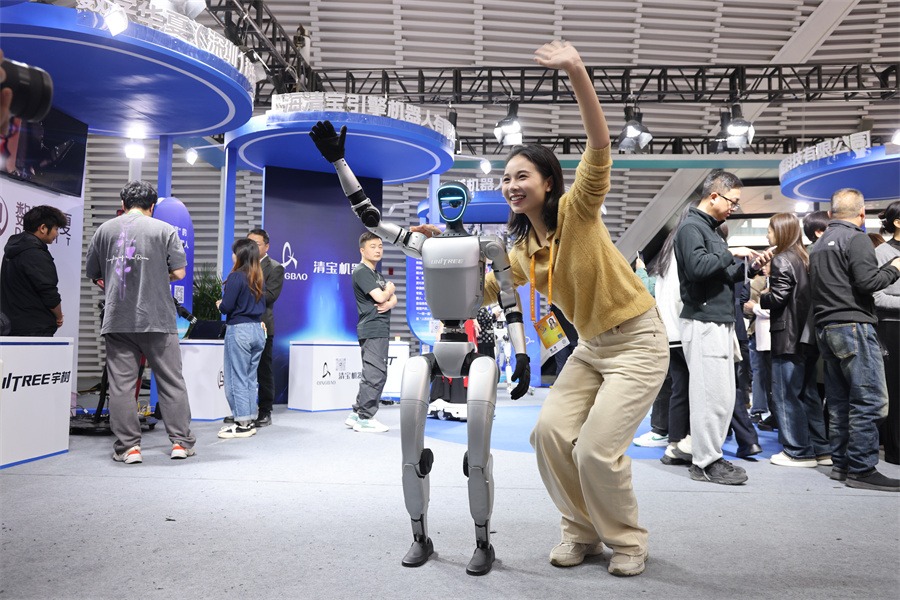Raising bar for healthcare industry


Johnson & Johnson CEO: We are not just here to sell products to China, but to discover, develop and manufacture
Arriving at Shanghai in his business jet late at night, Alex Gorsky had only a few hours' time to rest before appearing at Johnson & Johnson's Shanghai office at 6 in the morning.
The occasion? Gorsky, the global CEO of a leading world conglomerate, was leading a spinning exercise class. To Gorsky, the class is not only a way to stay in shape, but provides an opportunity to bond with colleagues, and an indispensable physical preparation for a day full of work.
It was Gorsky's second trip to China in a year. For a multinational company leader overlooking more than 60 markets, such a frequency is a strong indication of the company's focus on the Chinese market. This time, Gorsky came to announce the launch of JLabs, an incubator project that J&J started in 2012.
JLabs facilities in North America have incubated more than 200 companies and provided a home for more than 140 companies advancing biotech, pharmaceutical, medical device, consumer and digital health programs.
The JLabs established in Shanghai, covering 4,400 square meters in the Zhangjiang Hi-Tech Park in the eastern part of the city, will be the first of its kind outside North America. It will open in the second quarter of 2019.
Most Chinese still understand J&J as a consumer goods company for such products as baby shampoos. In fact, that sector is the smallest income contributor to J&J, which is actually the world's leading pharmaceutical and medical devices provider.
To Gorsky, the company's continuing image is not a surprise; consumer goods, after all, are the company's legacy. But he clearly is planning to change that stereotype with the company's continued investment in the healthcare sector in China.
As J&J's seventh CEO since the company went public in 1944, Gorsky demonstrates a big heart for people, which seems to fit perfectly into the disposition of a company like J&J. On the other hand, his studies at the US Military Academy of West Point and his six years' service in the US Army add firmness and down-to-earth spirit to his character.
In an exclusive interview with China Daily, Gorsky talked about his vision of possible changes brought to J&J with technology advancements, his understanding of the Chinese market, and his passion for sports.
Why are you choosing Shanghai for this JLabs and how will it function?
First is the number of university graduates. China produces more university graduates than any other country in the world and many of them are located right here in Shanghai.
China moves through the phases of not only educating so many young scientists and researchers, but translates those academic skills into product development and solution skills. It has gone through the clinical development and the regulatory development stages.
Second, when you consider the size, the breadth, the depth and the scale of China, having our researchers and scientists located right here makes sure that we understand the healthcare paradigm and the way in which healthcare providers and healthcare systems are thinking.
We will work with the venture community, academic centers, and startups in the JLabs. If you are an early or young entrepreneur, if you have an idea and need to go to a place where you have a desk or a laboratory, where you can talk with your peers and colleagues to challenge and innovate your big ideas, you can come to JLabs.
Are there any specific areas that this JLabs will study?
We are focusing on the problematic healthcare issues in China. For example, lung cancer, liver disease, upper GI and throat cancer. We will also focus on some areas in beauty, where Chinese consumers have very specific needs.
Eventually, we want to be able to discover and develop things here that we export to the rest of the world.
China may not be as competitive as developed markets such as the United States in terms of R&D ability. Will that be a concern to you?
Over the last 20 years, that has been the case. But now, with the number of graduates, the maturity and sophistication of the system, China is reaching a tipping point. We are starting to see some seeds of that in the pharmaceutical space. A lot of local consumer companies today are popping up and innovating very rapidly.
J&J is planning its first global lung cancer R&D center in China. Why are you choosing China as the starting place?
Unfortunately, about 60 percent of the world's cases of lung cancer are here in China. It is an opportunity to bring our pharmaceutical scientists, medical device scientists, and even our consumer behavior scientists together to see how could we discourage people from smoking in the first place, detect cancer earlier in the metastatic process, and bring about more holistic approaches combining therapeutic and surgical intervention at the right time and place to ultimately find a way to care for lung cancer comprehensively.
For this R&D center, we have appointed a leader in the United States-a very prominent oncologist who will be spending a considerable amount of time in Shanghai and Beijing to make this possible.
This year will be the 40th anniversary of China's reform and opening-up. What role do you think J&J has played over time?
I have been impressed particularly in recent years as the regulatory system continues to evolve. It has become more consistent and open.
J&J has been an important partner in a number of ways. We are helping to advance a scientific agenda through our R&D centers. We have eight manufacturing facilities in China. Early on, we demonstrated that we are not just here to sell products to China, but in fact to discover, develop and manufacture products here.
We work closely with regulatory authorities to make sure that they are also aware of best practices around the world, concerning regulatory and clinical development, so they can be incorporated into China. We always try to ensure that our compliance standards and quality standards are at a very high level, which helps to raise the bar in the entire industry in this country.
How will the adoption of technology change the landscape of the medical industry?
I think it's going to be absolutely central. The combining of healthcare technology and digital technology will accelerate at an incredibly rapid pace over the next decade.
One area is big data. Taking big data from the human genome to someone's epidemiology, and to other wearable sensors that may be picking up ongoing information about a patient, is going to dramatically change the way we think about drug discovery. We are going to have so much more information to understand the underlying pathophysiology of a disease.
I think we are going to incorporate sensors that will be taking in information 24/7 into prosthetic devices, so we can earlier detect infection, misalignment or other issues that will enable us to repair or replace joints and other systems.
I am very excited about the prospects in digital surgery. Going forward, we have a partnership that is beyond robotics. It is about how you digitize information captured during surgery to automatically better direct and guide a surgeon during pre-surgery inter-operatively and post-surgery that will overall lead to a better outcome.
How will the acquisition of Swiss pharmaceutical company Actelion make a difference to your business portfolio?
Actelion was the largest acquisition in J&J's history. It added a sixth pillar-pulmonary arterial hypertension-onto our five therapeutic areas. It is an area of unmet medical need to reach more patients and make sure they are treated earlier in the disease paradigm. We are convinced that combinations of therapies also give more comprehensive outcomes. And because of the very unique structure that we were able to design in the acquisition, we also have got a great opportunity for products in the spinout company, Idorsia, in areas such as Parkinson's disease, severe recalcitrant hypertension and other conditions.
Will the recent Trump administration's tax cut policies affect your business in the US and other markets?
It could potentially have a positive effect on everybody by giving us more flexibility in the way we deploy capital. We are hopeful that we will get much needed tax reform in the United States. Our current system was not designed for the reality of today's global economies. In the end, it will provide us potentially more flexibility and mobility of our capital around the world, and ultimately will help us make better investment decisions, here in China, in the United States and around the world.
How do your study at West Point and six years' service in the army influence your working philosophy?
I have been incredibly fortunate to work for two really mission-driven organizations: the army and J&J. I have learned a lot of lessons in the military. One is the importance of surrounding yourself with great people. Second is inspiring and motivating people to do things that they didn't think they could do on their own.
There is also durability, persistence, resilience, commitment, having a clear set of priorities and having very high standards when it comes to things like quality.
How often do you take part in sports?
Seven times a week. I don't remember the last time I didn't work out. If I'm not fit, there's no way I'll have the energy and the ability to get through that in the way that I think that I should. It is also a great stress reliever. Fortunately, my wife also loves fitness. So we work out together. It gives us time together.

CV
Name: Alex Gorsky
Age: 57
Education
Bachelor of Science degree from US Military Academy at West Point, New York
Master of Business Administration degree from The Wharton School of the University of Pennsylvania
Career
2012: CEO and chairman of Johnson & Johnson
2011: Vice-chairman of Johnson & Johnson's executive committee
2009: Worldwide chairman of the medical devices and diagnostics segment of Johnson & Johnson
2008: Group chairman of Ethicon Inc of Johnson & Johnson
2004: Head of pharmaceuticals business of Novartis Pharmaceuticals Corp North America
2003: Group chairman of Johnson & Johnson's pharmaceuticals business in Europe, the Middle East and Africa
2001: President of Janssen Pharmaceutica
1988: Sales representative at Janssen Pharmaceutica




































